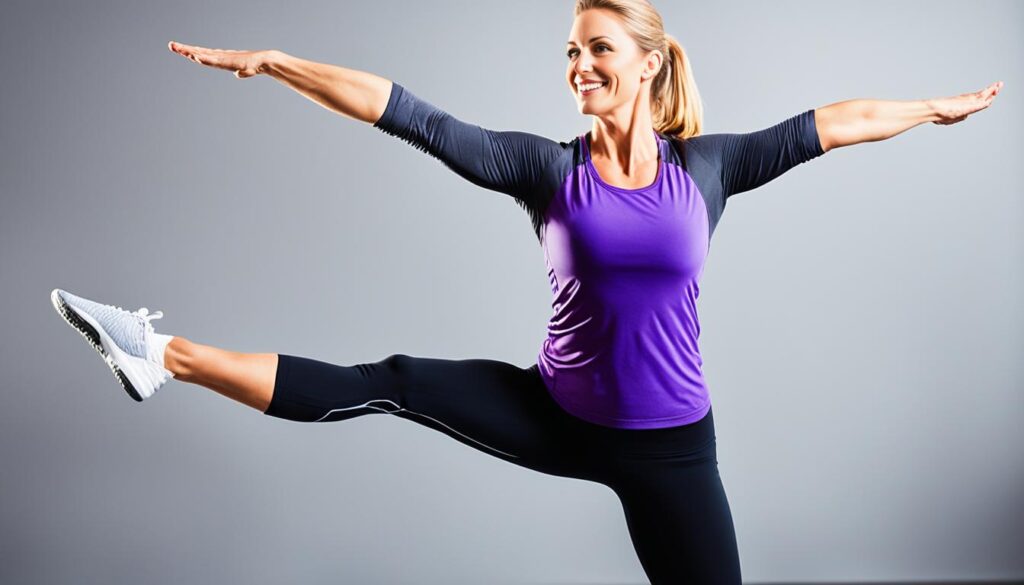Welcome to our blog post on the importance of physical fitness and its impact on our daily lives. Physical fitness is not just about looking good; it is about being able to perform daily tasks without feeling too tired or sore. Engaging in regular exercise and maintaining a good level of physical fitness offers numerous health benefits that contribute to our overall well-being.
Research studies have shown that physical activity plays a significant role in reducing the risk of chronic conditions such as non-insulin-dependent diabetes mellitus and coronary heart disease. By incorporating exercise into our lifestyle, we can improve our cardiovascular health and maintain physical well-being.
Exercise also has an impact on our mental health. Individuals who are physically fit often experience improved cognitive function, increased energy levels, and a better mood. By prioritizing physical fitness, we can enhance our daily activity performance and reduce the risk of developing chronic conditions such as obesity, heart disease, and diabetes.
Key Takeaways:
- Physical fitness is essential for our ability to carry out daily tasks without excessive fatigue or soreness.
- Regular exercise offers numerous health benefits and reduces the risk of chronic conditions.
- Engaging in physical activity improves cardiovascular health and overall well-being.
- Physical fitness plays a crucial role in mental health, including cognitive function and mood.
- Prioritizing exercise helps in improving daily activity performance and reducing the risk of chronic diseases.
The Benefits of Strength Training and Cardio Exercises
Incorporating strength training and cardio exercises into your fitness routine can have a significant impact on your overall fitness levels. Not only do these types of exercises help improve your physical health, but they also contribute to enhanced performance in daily activities.
Strength training exercises, such as lifting weights or using resistance bands, are effective ways to build muscle strength and endurance. By engaging in these activities, you can gradually increase your ability to perform tasks that require strength and stamina. Whether it’s carrying groceries, lifting heavy objects, or playing with your kids, a stronger body makes these activities easier and less exhausting.
Cardio exercises, on the other hand, elevate your heart rate and improve cardiovascular health. Activities like running, swimming, or cycling get your heart pumping, leading to increased endurance and stamina. Regular cardio workouts can enhance your body’s ability to deliver oxygen and nutrients to your muscles, making daily activities feel less strenuous.
Both strength training and cardio exercises contribute to the development of functional fitness. This type of fitness focuses on improving your ability to perform everyday tasks efficiently. Improving your overall fitness through these exercises means you’ll have the strength, endurance, and cardiovascular health necessary to tackle various activities in your daily life.
If you’re looking to improve your overall fitness, consider incorporating strength training and cardio exercises into your routine. By doing so, you’ll reap the benefits of increased muscle strength, endurance, and cardiovascular health, improving your ability to perform daily tasks without feeling excessively tired or sore.
Example Cardio Workout Routine
| Exercise | Duration |
|---|---|
| Running | 30 minutes |
| Swimming | 20 minutes |
| Cycling | 45 minutes |
Here’s an example of a cardio workout routine that you can incorporate into your fitness regimen:
- Start with a 5-10 minute warm-up, such as brisk walking or light jogging.
- Perform 30 minutes of running at a moderate intensity, aiming to maintain a consistent pace.
- Switch to swimming for 20 minutes, focusing on maintaining good form and breathing rhythm.
- Finish off with 45 minutes of cycling, either outdoors or on a stationary bike.
- Cool down with a 5-10 minute stretch to prevent muscle tightness.
Remember, it’s important to consult with a healthcare professional or certified fitness trainer before starting any new exercise regimen, especially if you have any underlying health conditions or injuries. They can guide you in creating a personalized fitness plan that suits your needs and goals.
The Importance of Flexibility Routines
Flexibility is a crucial component of functional fitness. Incorporating regular flexibility routines into our exercise regimen can enhance our ability to carry out daily tasks without strain or discomfort. Stretching exercises aimed at improving flexibility can increase our range of motion and reduce the risk of injuries during daily activities.
When it comes to flexibility routines, it’s important to focus on all major muscle groups, including the upper and lower body. By targeting these areas, we can ensure overall physical well-being and improve our functional fitness.
One effective flexibility routine is dynamic stretching, which involves moving the body through a full range of motion to improve flexibility and mobility. Examples of dynamic stretches include leg swings, arm circles, and torso twists. These exercises can be included as part of a warm-up or cool-down routine.
Another effective technique is static stretching, where stretches are held for a period of time to lengthen and relax the muscles. This type of stretching is best performed after a workout or physical activity to improve flexibility and prevent muscle tightness.
It’s important to note that flexibility routines should be performed regularly to see improvements over time. Incorporating these exercises into our fitness routine can make daily activities such as reaching, bending, and lifting easier and more comfortable.

By prioritizing flexibility in our fitness regimen, we can enhance our functional fitness and reduce the risk of injuries. Whether it’s through dynamic or static stretching, taking the time to improve flexibility is a valuable investment in our overall physical well-being.
The Role of Exercise in Daily Activity Performance
Engaging in regular exercise plays a vital role in maintaining physical well-being and optimizing daily activity performance. Research studies have consistently demonstrated the positive impact of physical fitness on various aspects of our lives, including cognitive function, energy levels, and mood.
Individuals who are physically fit generally experience improved cognitive function, including enhanced memory and mental clarity. This is attributed to increased blood flow to the brain during exercise, which promotes the growth of new brain cells and strengthens neural connections. By incorporating exercise into our daily routine, we can enhance our ability to focus, concentrate, and perform tasks more efficiently.
Furthermore, regular exercise boosts energy levels by stimulating the production of endorphins, which are known as the body’s natural feel-good hormones. These endorphins help to alleviate feelings of fatigue and promote an overall sense of well-being, enabling us to approach daily activities with greater enthusiasm and vigor.
“Exercise not only changes your body, it changes your mind, your attitude, and your mood.” – Unknown
In addition to the immediate benefits on cognitive function and energy levels, exercise also plays a crucial role in maintaining long-term physical well-being. Regular physical activity helps to reduce the risk of chronic conditions such as obesity, heart disease, and diabetes. It promotes healthy weight management, lowers blood pressure, improves cholesterol levels, and enhances insulin sensitivity.
To illustrate the impact of exercise on daily activity performance, consider the following table:
| Physical Activity | Benefits |
|---|---|
| Cardiovascular exercises (e.g., running, swimming) | Improves cardiovascular health, enhances endurance |
| Strength training (e.g., lifting weights, resistance training) | Increases muscle strength and endurance, improves functional fitness |
| Flexibility exercises (e.g., stretching, yoga) | Enhances range of motion, reduces the risk of injuries |
| Balance and coordination activities (e.g., Pilates, Tai Chi) | Improves stability, reduces the risk of falls |
As highlighted in the table, each type of physical activity contributes to different aspects of daily activity performance. Cardiovascular exercises improve endurance, strength training enhances functional fitness, flexibility exercises increase range of motion, and balance and coordination activities enhance stability.
By regularly engaging in a combination of these activities, we can ensure that we are adequately prepared to carry out daily tasks with optimal performance and minimal risk of fatigue or injury.

Overall, exercise is not only crucial for physical fitness but also plays a key role in optimizing daily activity performance. By prioritizing regular physical activity, we can maintain physical well-being, improve cognitive function, increase energy levels, and reduce the risk of chronic conditions. So, let’s embrace exercise as an integral part of our lives and enjoy the numerous benefits it brings.
Conclusion
Physical fitness is closely linked to our ability to carry out daily tasks without feeling excessively tired or sore. It plays a vital role in maintaining our overall well-being and quality of life. Incorporating regular exercise into our lifestyle, including strength training, cardio exercises, and flexibility routines, is essential for improving our fitness levels and ensuring functional fitness.
By engaging in various forms of exercise, we can enhance our daily activity performance and reduce the risk of chronic conditions such as obesity, heart disease, and diabetes. Exercise not only improves our physical health but also enhances cognitive function and boosts our energy levels. Prioritizing physical fitness today will lead to a healthier and more functional future.
So, start incorporating exercise into your daily routine and make it a priority. Whether it’s lifting weights, going for a run, or stretching, every form of exercise contributes to your overall fitness. Take small steps, set achievable goals, and enjoy the journey of becoming physically fit. Your body will thank you, and you’ll experience the benefits in every aspect of life.
